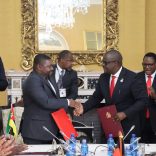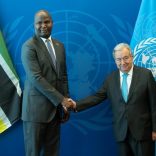Mozambican President reaffirms support for Sahrawi people and their legitimate right to freedom and ...
Mozambique: Short list of “civil society” candidates for CNE – AIM

File photo: CIP
The legal, constitutional and human rights affairs commission of the Mozambican parliament, the Assembly of the Republic, on Wednesday began interviewing candidates from civil society who are hoping for a seat on the National Elections Commission (CNE).
The CNE is a top-heavy, unprofessional and deeply politicised body. Thanks to a law passed in February 2014, under pressure from Renamo, it has 17 members – five from Frelimo, four from Renamo, one from the MDM, and seven from civil society.
But the civil society members are not genuinely chosen by civil society. Instead, names are put forward, and then an Assembly Ad-Hoc Commission chooses a short list from among them of between 12 and 16 names.
The ad-hoc commission consists of five deputies – three from Frelimo (Antonio Amelia, Lucilia Nota Hama and Goncalves Maceda), one from the main opposition party, Renamo (Jose Manteigas), and one from the Mozambique Democratic Movement, MDM (Jose Domingos Manuel).
This system means that the names from civil society organisations are filtered through the three political parties, and, with a majority on the Ad-Hoc Commission, Frelimo has a clear veto. The names on the short list will eventually go to the Assembly plenary for a final vote.
Filtering through the parties means that outspoken, independent voices are unlikely to make it onto the short list. Several genuine civil society bodies objected strongly to the system. While they did not propose boycotting the system, they did call for a much long period of discussion and preparation.
Also read: Mozambique: The heavy-weights out of the race for the CNE – Carta
A statement signed in late October by bodies such as the Women’s Forum, the Centre for Public Integrity (CIP), the Centre for Democracy and Development (CDD), the Forum of Community Radios (FORCOM) and the Mozambican chapter of the regional press freedom body MISA (Media Institute of Southern Africa) demanded “a public discussion of the profile of the candidates to be selected”.
This civil society statement said “to promote the permanent participation of citizens in the life of the nation, as defended by the Mozambican constitution, we favour a public debate on the terms of reference for the election, taking as its centre a discussion on the profile of the candidates, which should be in line with the principles of independence and impartiality”.
The statement argued that candidates for the CNE from civil society should not be members of or have other links with political parties “in order not to distort the independence demanded by the Constitution”.
The civil society organisation demanded that the Assembly Ad-Hoc Commission annul its announcement seeking candidates, and instead embark on public consultation about the profile expected of CNE members from civil society “to allow the drafting of objective criteria of eligibility in line with the nature of the CNE, which should be independent and impartial”.
The ad-hoc commission paid no attention to this statement and called for civil society bodies to submit the names of candidates for the CNE. A report from the ad-hoc committee dated Monday said it had received 151 names submitted by 35 organisations. It decided to put 16 of those names on the short list.
Two of the organisations that had called for annulment (the Women’s Forum and MISA) nonetheless submitted candidates. Many of the other organisations that submitted names could charitably be called obscure, with no publications or websites and no record of activity.
Perhaps the most significant organisation proposing candidates is the Christian Council of Mozambique, the umbrella body for the mainstream protestant churches. Three of its candidates are on the short list: Carlos Matsinhe, Antonio Vilankulu and Luis Zandamela.
Matsinhe is the Anglican bishop of the Lebombos diocese in southern Mozambique. It is likely that he will not only be voted onto the CNE, but will become its chairperson. Several past CNEs have been chaired by senior clerics, either Christian or, in the case of Abdul Carimo, chairperson of the outgoing CNE, Moslem.
Matsinhe was also proposed by the Council of Religions of Mozambique (which brings together prominent Christians, Moslems and Hindus) and by the Mozambican Association of Women, Religion and Development.
Daude Ibramugy and Maria Albino Mussuei, two other candidate of the Council of Religions are also on the short list.
Four members of the outgoing CNE are seeking re-election despite the shambles of the 2019 general election and 2018 municipal elections which that CNE ran. They are Paulo Cuinica, Jeremias Timana, Salomao Moyana and Apolinario Joao.
Cuinica was the spokesperson for the outgoing CNE, and is proposed by the little-known Christian Association for Community Development. Timana is General Secretary of the National Confederation of Free and Independent Unions of Mozambique (CONSILMO), the smaller of Mozambique’s two trade union confederations. If he is elected, this will be the third CNE Timana has sat on.
Moyana was proposed by the Mozambican Association for the Development of Democracy, but his real civil society credentials are decades of work as a journalist, at AIM, and later as editor of the weekly papers “Savana” and “Magazine Independente”.
Apolinario Joao was proposed by the Youth Association for Community and Development. Two other members of this little-known youth association, Rui Cherene and Armando Thaunde, are also on the ad-hoc commission’s short list.
The CTA (Confederation of Business Associations) proposed Lourenco Jossias, who took over from Moyana as director of the weekly “Magazine Independente”, when Moyana was elected to the CNE in 2014.
Alice Banze, a candidate proposed by the Women’s Forum, is the coordinator of Gender Links-Mozambique. The main trade union federation, the OTM (Organisation of Mozambican Workers) proposed Carla Munguambe, the coordinator of Comutra (National Committee of Working Women).
The 16th name on the short list is Rosario Quive, proposed by the National Teachers’ Union (ONP).
Comissão Ad Hoc da AR seleciona 16 finalistas às 7 vagas reservadas à sociedade civil na CNE












Leave a Reply
Be the First to Comment!
You must be logged in to post a comment.
You must be logged in to post a comment.